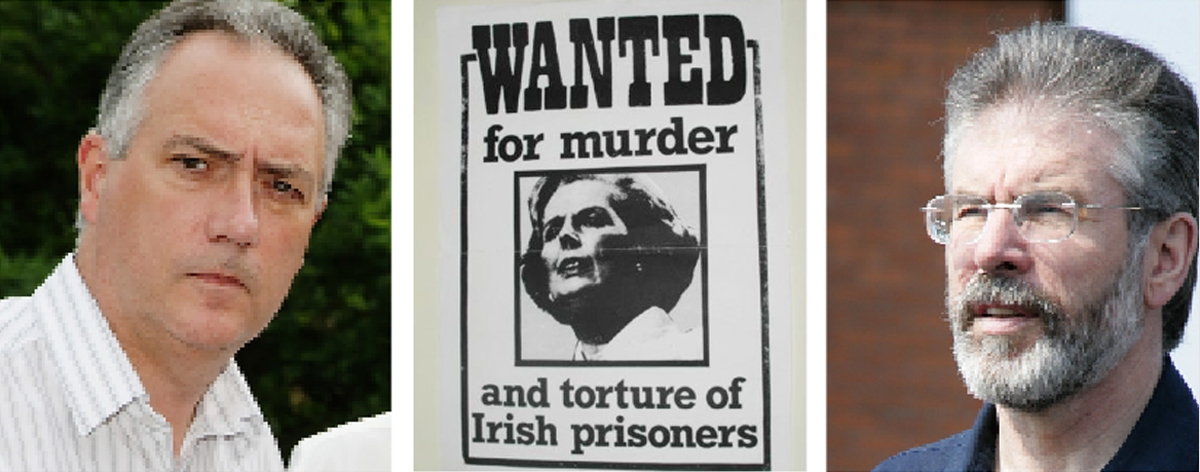While Margaret Thatcher’s death – just like her life – has divided opinion elsewhere, in West Belfast the memories of the former British Prime minister are still too raw for any eulogies.
Dubbed the Iron Lady, Mrs Thatcher died on Monday after suffering a stroke while staying in the Ritz Hotel in London. She was 87.
In power during the year of the 1981 hunger-strike, which made her a hate figure with republicans, she also signed the Anglo-Irish Agreement which saw unionist MPs resign their seats at Westminster and campaign against Irish government ‘interference’ in the North. She also survived an IRA assassination bid at the Grand Hotel in Brighton in October 1984 during the Conservative Party conference, which killed five people.
Speaking on news of her death, Sinn Féin President Gerry Adams said her militant policies in the North prolonged the conflict here.
“She embraced censorship, collusion and the killing of citizens by covert operations, including the targeting of solicitors like Pat Finucane, alongside more open military operations and refused to recognise the rights of citizens to vote for parties of their choice,” he said.
“Her failed efforts to criminalise the republican struggle and the political prisoners is part of her legacy. It should be noted that in complete contradiction of her public posturing, she authorised a back channel of communications with the Sinn Féin leadership but failed to act on the logic of this.
“Unfortunately she was faced with weak Irish governments who failed to oppose her securocrat agenda or to enlist international support in defence of citizens in the North.
“Margaret Thatcher will be especially remembered for her shameful role during the epic hunger strikes of 1980 and 81. Her Irish policy failed miserably."
Former IRA prisoner Seánna Walsh was equally critical. He said Mrs Thatcher drew the various governments in Dublin into increased collaboration in her “anti-republican crusade”.
“She gave carte blanche to her military and secret police to unleash their death squads against the wider nationalist population,” he said. “She made the British broadcast media the laughing stock of Europe and the US when she adopted and adapted Dublin’s censorship laws against republicans.
“She sought to criminalise the republican community and republican resistance to British rule in Ireland. She only succeeded in criminalising her government’s ebbing hold on the last corner of ‘The Empire’.”
The West Belfast republican said Thatcher came to embody everything that was “repugnant and unjust about Britain’s relationship with Ireland”.
He added: “No-one in my community will miss her. As for what she did on the British working-class, she emasculated the unions and their ability to defend working people. She devastated Britain’s mining, engineering and steel industries. She facilitated the ‘Murdochisation’ of the British press. She and others deregulated the international financial sector turning London’s ‘The City’ into one huge casino.”
West Belfast MP Paul Maskey said Thatcher, who was in power throughout the whole of the 1980s, “devastated working class communities” and was scathing of her actions during the conflict.
He added: “She infamously dismissed the African National Congress as ‘a typical terrorist organisation’ and was opposed to sanctions against apartheid in South Africa. This alone made her a hatred figure on the international stage.
“She sent orders to sink the Belgrano during the 1982 Falklands conflict killing over 1,000 Argentinian naval personnel.
“She decimated the mining communities throughout Britain hitting working classes and dividing families with her tactics.
“Many people will never forgive her for the role she played here in Ireland and I believe that few people will lose any sleep after hearing the news of her death.”
Mark Thompson, Director of victims’ group Relatives For Justice, said the former British Prime Minister’s role in Ireland was “an appalling and shameful episode that left in its wake an awful legacy of death and hurt that still remains unsolved”.
“From the prisons to the streets she had the power to prevent scores of deaths and to resolve conflict. She had neither intention nor inclination to do either,” he said. “Instead she pursued the policies of war through shoot-to-kill, plastic bullets, collusion, impunity, censorship, and propaganda. She intensified conflict and death.
“Such is Thatcher's legacy in relation to Ireland that she ranks alongside Cromwell and Trevelyan,” he added.
Upper Falls SDLP councillor, Tim Attwood, said his party disagreed fundamentally with Thatcher’s politics and her approach to the North.
“However reluctantly,” he added, “she helped deliver the Anglo Irish Agreement which helped plant the seeds for the Good Friday Agreement.”



